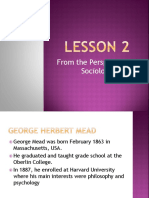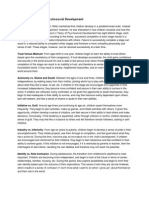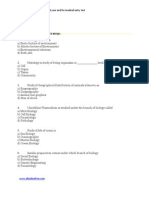Generalized Other Definition PDF
Generalized Other Definition PDF
Uploaded by
ArXlan XahirCopyright:
Available Formats
Generalized Other Definition PDF
Generalized Other Definition PDF
Uploaded by
ArXlan XahirOriginal Title
Copyright
Available Formats
Share this document
Did you find this document useful?
Is this content inappropriate?
Copyright:
Available Formats
Generalized Other Definition PDF
Generalized Other Definition PDF
Uploaded by
ArXlan XahirCopyright:
Available Formats
Generalized Other Definition
George Herbert Mead (1863-1931) was a symbolic integrationist who agreed
with Cooley that the self developed during social interaction. Mead considered the
generalized others to be general cultural norms and values society take as their own.
Taking the Role of the Other. Meads says that children learn to take the role of
others. At first children accept the attitude of specific people. At this stage they are
not yet ready to interact with a group. They have no conception of the normative
system involved, to boot.
Children React Only to Sign Flint Others. Significant others are those persons who
have the greatest influence on the formation of the social self such as parents. So
children react to these significant others.
Play is Critical to the Development of Self. Mead adds that play is critical to the
development of self. In play children learn to learn the role of others that is to put
themselves in some ones shoes to understand how some one else feels and thinks and
to anticipate how that person will act.
Generalized other
As the self gradually develops, children internalize the expectations of a large number
of people. Now they develop the ability to take the role "the group as a whole" to this
our perception of how in general think of us, Mead gives the term generalized other
Two Part Division in the Development of Social Self "I
and Me"
Meads sees two part division in the development of the social self e.g. meads I and
Me. The ME is the conventional part of self. The individuals predictable
response to the expectations of others. In other words, the me part of the self is an
object which other people react to and judge.
Taking the Role of Others is Essential
Taking the role of others is essential if we are to become co-operative members of
human group whether family, peers or work. This ability allows us to modify our
behavior by anticipating the reaction of others.
Generalized Other Three Stages of Development of Self
Meads contribution to words the development if self can be summed up into three
Stages which are discussed as under.
Preparatory Stage
It is the beginning of second year of child. In this stage the child starts giving
reactions to the outside environment. These responses are meaningless to the outsider.
The mother or other person in close contact with the child can understand his/her
behavior. By the end of the second year child starts talking and his/her vocabulary
consists of many words. For example
The Play Stage
This stage starts with the beginning of the third year of age. This has the following
examples.
1. Reaction to significant others. The child plays the role of significant other
like mother, father etc. The child behaves like significant others while playing
with toys.
2. The Child Gets Many Selves. At this stage the child gets many selves at the
same time. On one hand he plays his own role unconsciously and on other hand
play the role of individuals belonging to significant others. For example
sometimes a child wear his father coat and pretend to be his father.
Game Stage
The game stage starts at the fourth years of the child. The child starts thinking of
others as well as he tries to understand a question like what is he and he is not. In this
stage the child has a role and he changes the behavior according to the impressions of
others and in different situations.
From Generalized other concept we can learn that child develops as idea about the
self that whether he is normal or abnormal. This development is a lifelong process
but the early period of life is very important.
You might also like
- Charles Horton Cooley PDFDocument5 pagesCharles Horton Cooley PDFArXlan Xahir83% (6)
- The Case Study Method in Social Inquiry (Robert Stake, 1978)Document5 pagesThe Case Study Method in Social Inquiry (Robert Stake, 1978)baldher7791No ratings yet
- Kalidasa - Raghuvamsam (Penguin, 2016)Document443 pagesKalidasa - Raghuvamsam (Penguin, 2016)KumarNo ratings yet
- George Herbert Mead and The SelfDocument11 pagesGeorge Herbert Mead and The SelfMelizza Fajardo Bañano50% (2)
- Arabic Personal PronounsDocument10 pagesArabic Personal PronounsYourHandNo ratings yet
- Cycle 2 Foundations Presentation ScheduleDocument4 pagesCycle 2 Foundations Presentation ScheduleKristen Mudrezow LesterNo ratings yet
- The Self, I and Me: George Herbert Mead (1863 - 1931)Document12 pagesThe Self, I and Me: George Herbert Mead (1863 - 1931)Lola Pola100% (1)
- Sociology PresentationDocument9 pagesSociology PresentationAmayah De La CruzNo ratings yet
- Introduction to Sociology Unit 4 (1)Document9 pagesIntroduction to Sociology Unit 4 (1)belaywendasa29No ratings yet
- Mead's Three Stages of Development of Self Understanding The Self (Written Report)Document3 pagesMead's Three Stages of Development of Self Understanding The Self (Written Report)Bryan Dale Lucaban100% (1)
- Chapter3 Socialization Part1Document9 pagesChapter3 Socialization Part1Afnan AhmedNo ratings yet
- Sociology in Theory: Development of The Self: Preparatory StageDocument7 pagesSociology in Theory: Development of The Self: Preparatory StageAmrinder SaharanNo ratings yet
- Theoryof MeadDocument9 pagesTheoryof MeadjioooonnnnNo ratings yet
- UTSDocument2 pagesUTSjenNo ratings yet
- Mead's TheoryDocument6 pagesMead's TheoryNeha GoyalNo ratings yet
- Stages of SocialisationDocument4 pagesStages of SocialisationRaluca DănilăNo ratings yet
- Sociology - G.H.mead - Self and IdentityDocument4 pagesSociology - G.H.mead - Self and IdentityhalleyworldNo ratings yet
- From The Perspective of SociologyDocument22 pagesFrom The Perspective of SociologyJohanifa Indar BanisilNo ratings yet
- 2 Sociological Self 2Document18 pages2 Sociological Self 2Jhal Mark Le VillarealNo ratings yet
- Week3 SocializationnaturevsnurtureDocument2 pagesWeek3 Socializationnaturevsnurtureapi-298382201No ratings yet
- Chapter 2 The Sociological Perspective of The Self e ModuleDocument11 pagesChapter 2 The Sociological Perspective of The Self e ModuleLois Alzette Rivera AlbaoNo ratings yet
- Understanding The Sel1 Lesson 3Document7 pagesUnderstanding The Sel1 Lesson 3Jaymar A. AltameraNo ratings yet
- Theory of Self, C.H. CooleyDocument10 pagesTheory of Self, C.H. CooleyDevesh JNo ratings yet
- Module 13 - Socio-Emotional Development of PreschoolerDocument14 pagesModule 13 - Socio-Emotional Development of Preschoolertaw real100% (3)
- SocialisationDocument16 pagesSocialisationTanvir MahtabNo ratings yet
- Socialization of Nature Vs NurtureDocument4 pagesSocialization of Nature Vs Nurtureapi-303011030No ratings yet
- Freud's Structural and Topographical Models of PersonalityDocument27 pagesFreud's Structural and Topographical Models of PersonalityRozanawati Ahmad100% (1)
- Abstraction:: What Is Theory of The Mind? AnswerDocument5 pagesAbstraction:: What Is Theory of The Mind? AnswerジョージNo ratings yet
- Theory No 1Document5 pagesTheory No 1Aaleen KtkNo ratings yet
- GdgesgesgChapter 04 SocializationDocument33 pagesGdgesgesgChapter 04 SocializationPatricia PabustanNo ratings yet
- Self Module 02 PDFDocument5 pagesSelf Module 02 PDFMalaluan, Njel Shane L.No ratings yet
- UTS ReviewerDocument3 pagesUTS ReviewerMaya OrtegaNo ratings yet
- Lecture 4 Life and Career StagesDocument19 pagesLecture 4 Life and Career StagesPatricia NjeriNo ratings yet
- What Is Theory of The Mind?Document3 pagesWhat Is Theory of The Mind?ジョージNo ratings yet
- Sammy Social SkillsDocument10 pagesSammy Social SkillsShacara Millington100% (1)
- Activity - Lesson 2Document3 pagesActivity - Lesson 2DianePaguiaAngelesNo ratings yet
- Sociological Understanding of SelfDocument7 pagesSociological Understanding of SelfTARUSH JAINNo ratings yet
- Understanding The Self - SociologyDocument16 pagesUnderstanding The Self - SociologyJohnrogel IlinganNo ratings yet
- Chapter 4 Student ReviewerDocument16 pagesChapter 4 Student ReviewerdeejNo ratings yet
- Socialization Nature Vs NurtureDocument3 pagesSocialization Nature Vs Nurtureapi-272868139100% (1)
- Chapter 5: SocializationDocument5 pagesChapter 5: SocializationUjjwal PoudelNo ratings yet
- The Self From Sociological PerspectiveDocument19 pagesThe Self From Sociological PerspectiveJoseph GratilNo ratings yet
- Assignment 8610Document25 pagesAssignment 8610Shahyan Ali SiyalNo ratings yet
- Social Development TheoriesDocument28 pagesSocial Development Theorieschristian09No ratings yet
- EriksonDocument4 pagesEriksonJohn Vincent Malate EspartinezNo ratings yet
- Understanding The Self 3 - SociologyDocument61 pagesUnderstanding The Self 3 - Sociologyarvinjohn1211No ratings yet
- Theories of SocialisationDocument8 pagesTheories of SocialisationBobby S. MathewNo ratings yet
- Module 2.DocxDocument6 pagesModule 2.DocxSisi Narciso BolanteNo ratings yet
- Module 17Document11 pagesModule 17BENIAL Shella Mae P.100% (1)
- Pages From Herbert Blumer - George Herbert Mead and Human Conduct (2004)Document13 pagesPages From Herbert Blumer - George Herbert Mead and Human Conduct (2004)mohapisthaba77100% (1)
- MeadDocument12 pagesMeadjohn ashley martinezNo ratings yet
- The Self From Various PerspectivesDocument20 pagesThe Self From Various Perspectivesking ryan angelo jasper100% (2)
- Activity - Child and AdolescentDocument6 pagesActivity - Child and AdolescentJohn Darryl GenioNo ratings yet
- Sociological PerspectiveDocument6 pagesSociological Perspectiveventibarbatoes1No ratings yet
- Developmental Stages 084316Document68 pagesDevelopmental Stages 084316Rico jay Arroyo100% (1)
- George Herbert MeadDocument5 pagesGeorge Herbert MeadTrixieeeNo ratings yet
- Erik Erikson - Psychosocial Stages - Simply PsychologyDocument5 pagesErik Erikson - Psychosocial Stages - Simply PsychologyBSN 2014No ratings yet
- 01 SocializationDocument26 pages01 Socializationmoonna0% (1)
- Understanding The Self ReportDocument7 pagesUnderstanding The Self ReportC-Maine OdaragNo ratings yet
- Chapter 3: Socialization: I. What Is Human Nature?Document11 pagesChapter 3: Socialization: I. What Is Human Nature?Sumeet KumarNo ratings yet
- Handouts AaDocument3 pagesHandouts AaEivra NitsujNo ratings yet
- Building Identity: The Social Self: Group 1Document18 pagesBuilding Identity: The Social Self: Group 1alanllaguna18No ratings yet
- 4A. George Herbert Mead's Theory of The Social SelfDocument9 pages4A. George Herbert Mead's Theory of The Social SelfPunjab Metrobus Authority PMANo ratings yet
- Spark SQLDocument28 pagesSpark SQLArXlan XahirNo ratings yet
- Resilient Distributed DatasetsDocument40 pagesResilient Distributed DatasetsArXlan XahirNo ratings yet
- CS Course List OnlineDocument29 pagesCS Course List OnlineArXlan XahirNo ratings yet
- Big Data Analytics in Apache SparkDocument79 pagesBig Data Analytics in Apache SparkArXlan XahirNo ratings yet
- Module 5: Apache SparkDocument18 pagesModule 5: Apache SparkArXlan XahirNo ratings yet
- Notes On Set Theory and Probability Theory: Michelle AlexopoulosDocument37 pagesNotes On Set Theory and Probability Theory: Michelle AlexopoulosArXlan XahirNo ratings yet
- Transaction Practice QuestionsDocument1 pageTransaction Practice QuestionsArXlan XahirNo ratings yet
- Node BeginnerDocument74 pagesNode Beginnerabdullah.abdnNo ratings yet
- FlowchartsDocument5 pagesFlowchartsArXlan XahirNo ratings yet
- Chemistry Notes PDFDocument101 pagesChemistry Notes PDFahmad.farazNo ratings yet
- Chemistry Ebook For Entry Test PreparationDocument58 pagesChemistry Ebook For Entry Test PreparationArXlan XahirNo ratings yet
- Image Formation by Spherical Lenses: Project: OSCARDocument18 pagesImage Formation by Spherical Lenses: Project: OSCARArXlan XahirNo ratings yet
- Biology MCQS: Mcqs Biology 1St Year & 2Nd Year and For Medical Entry TestDocument58 pagesBiology MCQS: Mcqs Biology 1St Year & 2Nd Year and For Medical Entry TestR.S.H67% (3)
- Mcat 2010Document15 pagesMcat 2010ArXlan XahirNo ratings yet
- BrachingDocument2 pagesBrachingArXlan XahirNo ratings yet
- Assign 4Document1 pageAssign 4ArXlan XahirNo ratings yet
- Monday 27 April, 2015 Till 1:30pm Submission Path: //xeon/spring 2015/sidra Basharat/ITC/submissions/assign-3Document2 pagesMonday 27 April, 2015 Till 1:30pm Submission Path: //xeon/spring 2015/sidra Basharat/ITC/submissions/assign-3ArXlan XahirNo ratings yet
- Assign 6Document4 pagesAssign 6ArXlan XahirNo ratings yet
- Derraz-Linguistics (Not Exactly)Document186 pagesDerraz-Linguistics (Not Exactly)hassan.es-slimaniNo ratings yet
- Pal I LiteratureDocument142 pagesPal I Literatureกฤษณ บุญเจิม100% (1)
- Detailed LP-moral IssuesDocument10 pagesDetailed LP-moral IssuesJackielyn ToledoNo ratings yet
- Essay On Dramatic Poesy by John Dryden PDFDocument3 pagesEssay On Dramatic Poesy by John Dryden PDFIrfan MehmoodNo ratings yet
- Student Guide: InternationalDocument19 pagesStudent Guide: InternationalMaria Fernanda G. LechugaNo ratings yet
- 5 - Infix To Postfix Conversion Using StackDocument17 pages5 - Infix To Postfix Conversion Using StackBoyina ViswanthNo ratings yet
- What Is KotlinDocument21 pagesWhat Is KotlinsubbareddyNo ratings yet
- DMS Assignment 2Document1 pageDMS Assignment 2NibbaNo ratings yet
- Final-Report Philippines PDFDocument24 pagesFinal-Report Philippines PDFCas SosaNo ratings yet
- UntitledDocument4 pagesUntitledNicole SantosNo ratings yet
- Fra Lippo LippiDocument9 pagesFra Lippo Lippinavya SethiNo ratings yet
- Ruth Behar Rage and RedemptionDocument52 pagesRuth Behar Rage and RedemptionKaka PortilhoNo ratings yet
- Affixes, Prefix, Suffix, InfixDocument12 pagesAffixes, Prefix, Suffix, InfixSeptri Ambarita100% (2)
- MODULE 6 COMMUNICATION FOR VARIOUS PURPOSES Part 1Document2 pagesMODULE 6 COMMUNICATION FOR VARIOUS PURPOSES Part 1Ashley Judd Mallonga BeranNo ratings yet
- Teacher Learner and Student Teacher Identity in TESOLDocument15 pagesTeacher Learner and Student Teacher Identity in TESOLminhan15No ratings yet
- Hello World CatalogueDocument41 pagesHello World CatalogueA7m A7mNo ratings yet
- BASIC 6 Exam Questions-2Document7 pagesBASIC 6 Exam Questions-2lblooming488No ratings yet
- MilanMUN 2021 - Country ListDocument1 pageMilanMUN 2021 - Country ListMilan MunNo ratings yet
- Literature Review On Interest GroupsDocument4 pagesLiterature Review On Interest Groupsc5qvf1q1100% (1)
- Architectural Technologist Cover LetterDocument7 pagesArchitectural Technologist Cover Letterkezevifohoh3100% (2)
- Module 1 - Lesson 2Document4 pagesModule 1 - Lesson 2Lucy May DuriaNo ratings yet
- Module 3 CT Assignment Hyperdoc - Raymonds Run - InferencingDocument2 pagesModule 3 CT Assignment Hyperdoc - Raymonds Run - Inferencingapi-446537912No ratings yet
- Practical - 5 PDFDocument6 pagesPractical - 5 PDFYASH MODINo ratings yet
- Guía de Pruebas de OWASP Ver 3.0Document73 pagesGuía de Pruebas de OWASP Ver 3.0mipingoNo ratings yet
- Oracle Weblogic Server 11g Admin EssentialsDocument4 pagesOracle Weblogic Server 11g Admin EssentialsSureshNo ratings yet
- 8 Parts of Speech TableDocument6 pages8 Parts of Speech TableAnonymous UadvwxNo ratings yet
- 1Document3 pages1Jibanta NathNo ratings yet













































































































